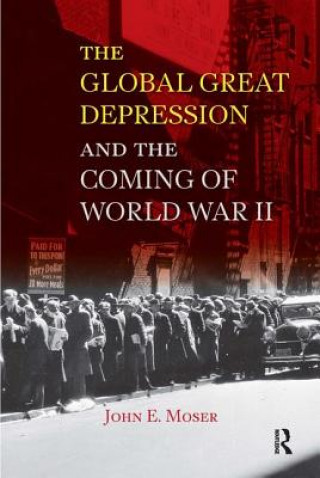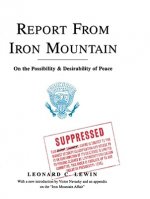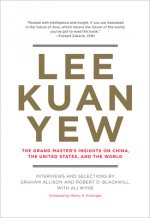
Code: 04830615
Global Great Depression and the Coming of World War II
by John E Moser, Alison Cook-Sather
"The Global Great Depression and the Coming of World War II" demonstrates the ways in which the economic crisis of the late 1920s and early 1930s helped to cause and shape the course of the Second World War. Historian John E. Mose ... more
- Language:
 English
English - Binding: Hardback
- Number of pages: 238
Publisher: Taylor & Francis Ltd, 2015
- More about this

You might also like
-

Reaching and Teaching Middle School Learners
40.47 € -

Russian Revolution, 1905-1921
146.78 € -

BJ's Bean Patch
12.67 € -

Bending Home
15.21 € -16 % -

A Manual of Field Astronomy
25.76 € -

Blood Feud
16.83 € -11 % -

Freeconomics
48.58 € -1 % -

American Senate
26.67 € -19 % -

Peppa Pig: Peppa Goes to Hospital: My First Storybook
6.38 € -27 % -

At Home in the World
65.02 € -

Rethinking Macroeconomics for Sustainability
38.94 € -4 % -

Paws, Claws and Frilly Drawers
6.08 € -18 % -

Restored Vessel
16.73 € -

Patti Smith's Horses
13.08 € -19 %
Give this book as a present today
- Order book and choose Gift Order.
- We will send you book gift voucher at once. You can give it out to anyone.
- Book will be send to donee, nothing more to care about.
More about Global Great Depression and the Coming of World War II
You get 531 loyalty points
 Book synopsis
Book synopsis
"The Global Great Depression and the Coming of World War II" demonstrates the ways in which the economic crisis of the late 1920s and early 1930s helped to cause and shape the course of the Second World War. Historian John E. Moser points to the essential uniformity in the way in which the world s industrialized and industrializing nations responded to the challenge of the Depression. Among these nations, there was a move away from legislative deliberation and toward executive authority; away from free trade and toward the creation of regional trading blocs; away from the international gold standard and toward managed national currencies; away from chaotic individual liberty and toward rational regimentation; in other words, away from classical liberalism and toward some combination of corporatism, nationalism, and militarism.For all the similarities, however, there was still a great divide between two different general approaches to the economic crisis. Those countries that enjoyed easy, unchallenged access to resources and markets the United States, Great Britain, the Soviet Union, and France tended to turn inward, erecting tariff walls and promoting domestic recovery at the expense of the international order. On the other hand, those nations that lacked such access Germany and Japan sought to take the necessary resources and markets by force. The interplay of these powers, then, constituted the dynamic of international relations of the 1930s: have-nots attempting to achieve self-sufficiency through aggressive means, challenging haves that were too distrustful of one another, and too preoccupied with their own domestic affairs, to work cooperatively in an effort to stop them."
 Book details
Book details
Book category Books in English Society & social sciences Politics & government
212.82 €
- Full title: Global Great Depression and the Coming of World War II
- Author: John E Moser, Alison Cook-Sather
- Language:
 English
English - Binding: Hardback
- Number of pages: 238
- EAN: 9781594517495
- ISBN: 1594517495
- ID: 04830615
- Publisher: Taylor & Francis Ltd
- Weight: 453 g
- Dimensions: 229 × 152 × 18 mm
- Date of publishing: 30. January 2015
Trending among others
-

Flash Boys - A Wall Street Revolt
12.87 € -

Clash of Orthodoxies
12.87 € -21 % -

Sandworm
26.57 € -20 % -

Wretched of the Earth
10.64 € -20 % -

State and Revolution
4.96 € -18 % -

Children of the Matrix
17.24 € -19 % -

My Autobiography
11.66 € -28 % -

J Curve
19.26 € -12 % -

Case Against the Sexual Revolution
14.90 € -29 % -

The Trigger
22.92 € -26 % -

GREEN BOOK
7.29 € -28 % -

Yoga of Eating
11.35 € -25 % -

Powershift
8.21 € -21 % -

Politics
47.06 € -14 % -

Xi Jinping: The Governance of China
31.64 € -

Master of the Senate
23.52 € -10 % -

Report From Iron Mountain
13.18 € -13 % -

Reflections of a Nonpolitical Man
19.37 € -19 % -

Empire of Lies
14.39 € -16 % -

Xi Jinping: The Governance of China II
25.65 € -

History of European Conservative Thought
23.73 € -21 % -

Accidental Superpower
18.35 € -19 % -

The Lords of Poverty: The Power, Prestige, and Corruption of the International Aid Business
12.47 € -27 % -

Abaddon Ascending: The Ancient Conspiracy at the Center of CERN's Most Secretive Mission
17.03 € -19 % -

Cold and the Dark
19.26 € -16 % -

Fight Like A Girl
10.34 € -28 % -

Giants
17.03 € -19 % -

Identity
11.35 € -23 % -

Lee Kuan Yew
18.35 € -20 % -

Deep State
15.41 € -24 % -

Next Decade
17.95 € -1 % -

Age of Ambition
11.35 € -28 % -

Return of Marco Polo's World
15.21 € -21 % -

Force of Reason
17.64 € -16 % -

Against Civilization
14.39 € -17 % -

Political Brain
14.19 € -26 % -

Politics: A Very Short Introduction
10.13 € -28 % -

Urban Warfare in the Twenty-First Century
25.55 € -9 % -

Nuclear Weapons and Foreign Policy
22.51 € -2 % -

Trade Marketing, Category Management, and Shopper Marketing
90.07 € -

Spirit of the Laws
23.93 € -

Psychology of Politics
20.48 € -

Reveille for Radicals
13.79 € -20 % -

Liberalism and Its Critics
32.65 € -

Voices from the Contemporary Japanese Feminist Movement
51.32 € -

Calculus of Consent
14.60 € -7 % -

Joint Terminal Attack Controller (JTAC) Training Program
19.47 € -

Origins of American Politics
16.53 € -

Red Petrograd
21.09 € -4 %
Collection points Bratislava a 2642 dalších
Copyright ©2008-24 najlacnejsie-knihy.sk All rights reservedPrivacyCookies



 15549 collection points
15549 collection points Delivery 2.99 €
Delivery 2.99 € 02/210 210 99 (8-15.30h)
02/210 210 99 (8-15.30h)